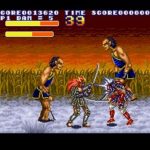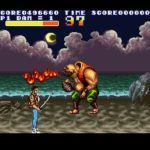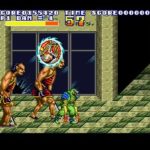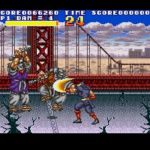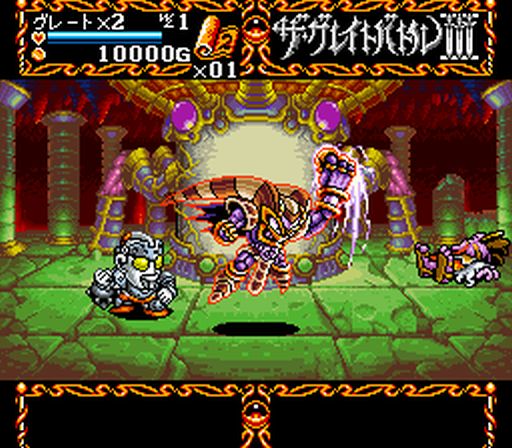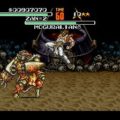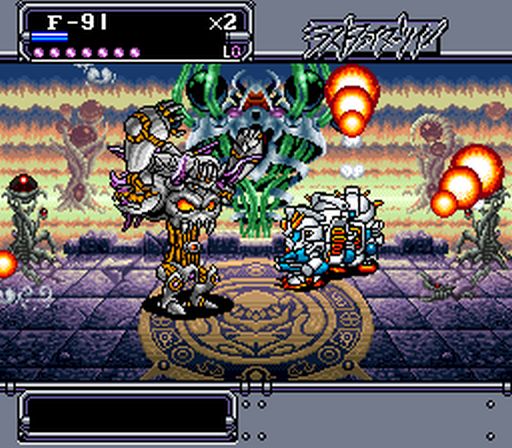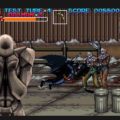Developer:SNK Publisher: Data East Released: September 22, 1993 Genre: Beat em up
I consider myself fortunate to have grown up in an area with multiple Neo Geo MVS units. If I saw a Neo Geo game in a magazine chances are it would show up somewhere in my neighborhood. Yet somehow there were still games that fell through the cracks. Sengoku looked like the coolest brawler in the world but I didn’t play it until years after release. What I found was a decent but frustrating game that had interesting ideas that didn’t come together in the end. I still looked forward to the SNES port and was sad when it was cancelled. I shouldn’t have been as it is an almost completely different game that isn’t as good.
Two samurai teamed up to defeat a tyrannical warlord centuries ago. Before his death the warlord vowed to return in the future. Now in modern times it falls to the descendants of the two samurai prevent his return. Aside from the name and general framework the SNES version of Sengoku is a vastly different game from its SNK counterpart. It is better in some ways and worse in others. They certainly tried but Sengoku is not a compelling game.
In the arcade Sengoku resembled your typical brawler but played differently. Most enemies died in a single hit and stronger thugs are instead knocked down. There are no combos to speak of which made the game very dull. The home version rectifies a lot of that. Enemies have life bars and both player characters have an actual move set. Now that enemies are more resilient weapons are more valuable. Unlike other games weapons last a set amount of time. They can also be further upgrade to unleash strong projectiles. While the general gameplay has been changed significantly Sengoku still retains the arcade game’s signature feature, the transformations.
Our two heroes are strong on their own but can invoke the spirits of the past to transform into a variety of forms. You can transform into a samurai with a long sword, an agile ninja or a completely useless wolf. The forms are the same as the arcade but you can’t change at will. Here you must collect the corresponding orb first. Each of these forms last a decent while and are almost game breaking. Orbs drop frequently enough that you won’t spend much time in your base form. As if these forms weren’t strong enough, you can collect further orbs that give them projectile attacks that break the game.
The pacing in Sengoku is different from other titles and I’m not sure I like it. As you progress through each stage at set points you are transported to another realm. Here you fight multiple waves of stronger enemies before sometimes facing off against a miniboss. These segments are incredibly tedious and prolong an already dull game. Every stage has at least three or four of these and they rarely differ. Now if they had new enemies it would be one thing. But you are facing the same three or four enemies you have already fought numerous times. It smacks of a missed opportunity to do something unique and add more flavor to the game.
Sengoku seems feature rich yet somehow is boring. As cool as the transformations are they are even more limited than your base form. The novelty wears off pretty fast and it becomes routine quickly. The try to pace things out by introducing a new enemy every level. However you’ll fight that same enemy at least twenty times before the stage is over. This is a problem with most games in the genre but it feels especially egregious here. I want to like Sengoku but it simply isn’t compelling despite its best efforts.
Sengoku is easy compared to most games in the genre. Although your move set is small even the basic combo is strong. One move particular is OP; the flying pile-driver drains 60% of an enemy’s life bar. You can easily spam it and clear out waves in seconds. With a weapon in hand the weak enemy AI simply doesn’t stand a chance, let alone even puts up a fight. Even if you don’t rely on that the various transformations are just as strong. It really is absurd how easily you can wipe out groups of enemies once you change, and the game dishes out orbs like candy. With the generous scoring you’ll earn at least one extra life on every level. Finishing the game on one credit is a foregone conclusion, not a test of skill.
In Closing
I can respect what they tried to do with Sengoku but it simply doesn’t work. Sengoku isn’t completely bad but it isn’t very good either. A straight arcade port would probably have been better rather than this confused mess.


